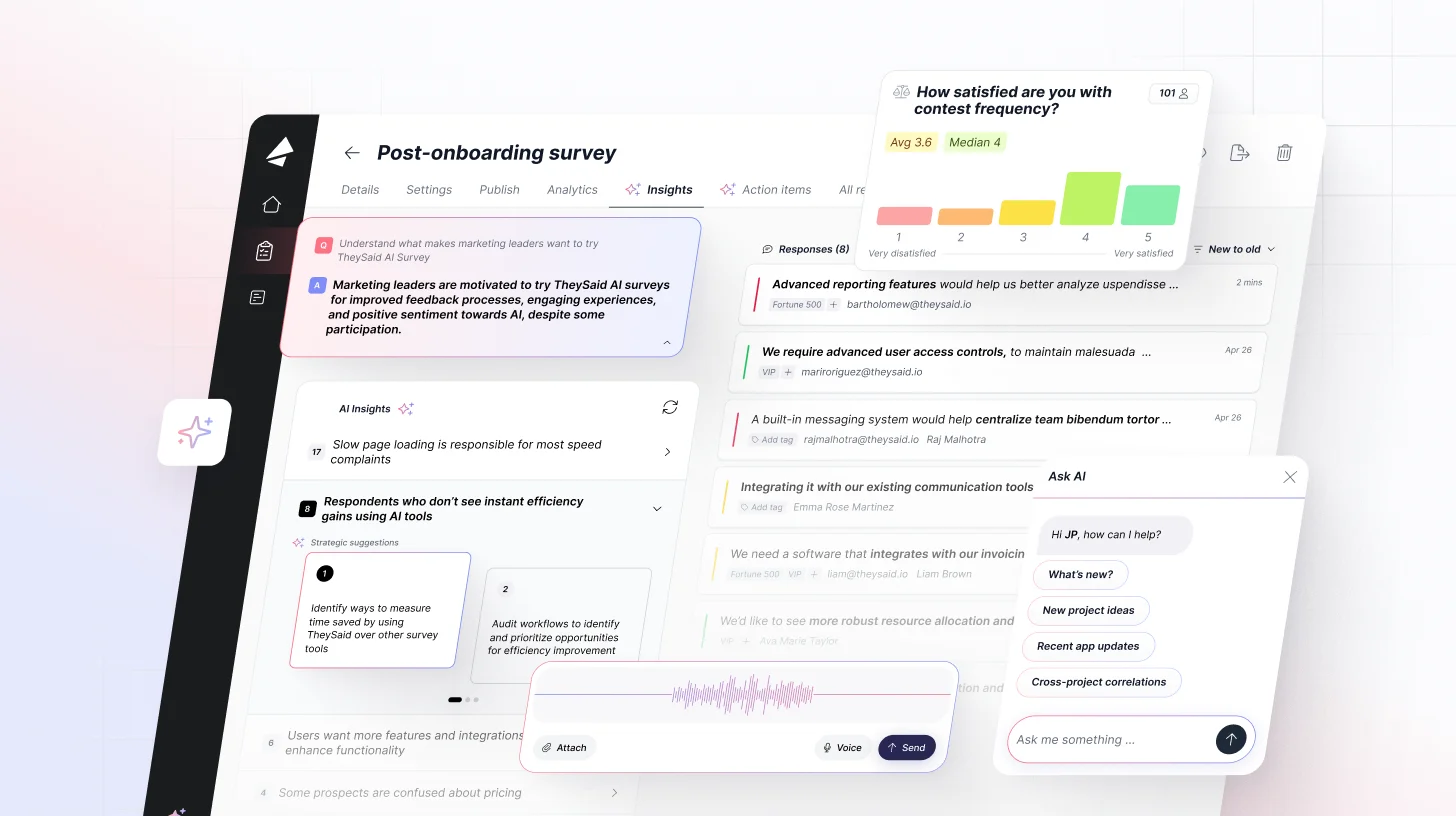 Blog
Blog Workshop Feedback Survey Questions: 40+ Questions for Better Results
Workshop Feedback Survey Questions: 40+ Questions for Better ResultsWorkshop Feedback Survey Questions: 40+ Questions for Better Results

Getting people to fully engage during workshops can feel like trying to hold water in your hands. Most feedback falls through the cracks. Yet the right workshop feedback survey questions can catch what participants actually think about your session.
Most people invest tons of money in workshops but rarely find out if they hit the mark. Smart surveys grab what's in participants' minds right after the event – capturing both wins and fixable problems that would otherwise go unnoticed.
Today, we've put together over 40 powerful questions across different categories to help you collect feedback that actually improves your next workshop.
Read - Workshop Feedback Survey Questions: 40+ Questions for Better Results
40+ Workshop Feedback Survey Questions You Should Ask
Content Relevance
These questions measure if your workshop material connected with participants' actual needs.
- Was the workshop content relevant to your current work challenges?
- Did the workshop cover topics you can apply in your daily tasks?
- How well did the workshop content match what was promised in the description?
- Which parts of the workshop content were most applicable to your job?
- Rate how well the content addressed your specific learning needs.
Use these questions for: Finding gaps between what you think matters and what participants actually need. These help fine-tune future content to match real-world applications rather than just covering theory participants won't use.
Presenter Effectiveness
These questions evaluate how well your facilitator connected with the audience and delivered the material.
- How would you rate the presenter's knowledge of the subject matter?
- Was the presenter able to explain complex concepts clearly?
- How effectively did the presenter answer questions?
- Did the presenter keep the workshop engaging and interactive?
- Was the presenter prepared and organized?
- How well did the presenter manage time during the workshop?
Use these questions for: Spotting communication issues that might block learning. Even amazing content fails when poorly delivered, so these workshop feedback survey questions help identify if you need a different presenter or just some coaching for your current one.
Workshop Structure & Flow
These questions check if your workshop was organized in a way that supported learning.
- Was the workshop properly paced for the content covered?
- How logical was the flow from one topic to the next?
- Did the workshop include enough breaks?
- Was there a good balance between instruction and hands-on activities?
- Did the workshop start and end on time?
- Was the length of the workshop appropriate for the content?
Use these questions for: Fixing structural problems that frustrate participants. Bad pacing or flow issues make people tune out regardless of content quality, so these workshop feedback survey questions help optimize the structure for maximum engagement.
Learning Environment
These questions assess whether the physical or virtual setup supported the learning experience.
- How comfortable was the workshop venue/platform?
- Could you see and hear the presentation clearly?
- Were the technical aspects of the workshop handled smoothly?
- Did the workshop space allow for proper interaction with other participants?
- Rate the quality of the provided materials (handouts, slides, etc.)
- If virtual, how effective was the online platform for this workshop?
Use these questions for: Removing environmental barriers to learning. People can't absorb information when basic comfort or access issues exist, so these questions identify fixable logistical problems.
Participant Engagement
These questions measure how actively involved people felt during your workshop.
- Did you have enough opportunities to ask questions?
- How engaging were the activities and exercises?
- Did you feel comfortable participating in group discussions?
- Were you able to stay focused throughout the workshop?
- Did the workshop include enough interactive elements?
- How well did activities reinforce the key concepts?
Use these questions for: Boosting active participation. Passive learning rarely sticks, so these help identify if your workshop format encourages actual involvement or just creates spectators.
Knowledge Gain
These questions evaluate whether participants actually learned something valuable.
- How much new knowledge did you gain from this workshop?
- Can you list three key concepts you learned today?
- How confident do you feel applying what you learned?
- Which skills from the workshop do you plan to implement first?
- Were there topics you hoped would be covered but weren't?
- Do you feel you need more training on any topics covered?
Use these questions for: Measuring actual learning outcomes rather than just satisfaction. These survey questions reveal if knowledge transfer actually happened or if you just created a pleasant but ineffective experience.
Practical Application
These questions check if participants can use what they learned in real situations.
- How immediately can you apply what you learned to your work?
- What obstacles might prevent you from using these new skills?
- How likely are you to change your work approach based on this workshop?
- Which specific tasks will improve with your new knowledge?
- Do you need additional resources to implement what you learned?
- How would you measure the success of applying these workshop insights?
Use these questions for: Finding implementation barriers. Learning that never gets used wastes everyone's time, so these identify what might block applications and what support might help.
Overall Satisfaction & Improvement
These questions capture general impressions and gather ideas for making future workshops better.
- How likely are you to recommend this workshop to colleagues?
- What was the most valuable part of this workshop?
- What was the least valuable part of this workshop?
- What additional topics would you like to see in future workshops?
- What specific changes would make this workshop more effective?
- If you could add one thing to this workshop, what would it be?
- Rate your overall satisfaction with this workshop experience.
Use these questions for: Getting honest feedback about what worked and what didn't. These workshop feedback survey questions help prioritize specific improvements that matter most to participants.
Read - 70 Workplace Wellness Survey Questions to Boost Employee Well-being
Questions and Mistakes to Avoid When Drafting Workshop Surveys

"How much did you enjoy our excellent workshop?"
This question assumes participants enjoyed the workshop and just wants them to confirm how much. It pushes people toward positive responses even if they have legitimate concerns. Replace with neutral phrasing like "How would you rate this workshop overall?" to get honest feedback.
"The workshop content and presenter were effective, right?"
This double-barreled question combines two separate aspects that deserve individual evaluation. A participant might think the content was great but the presenter was boring. Split this into separate questions about content and presenter effectiveness for accurate questions.
"On a scale from 1-10, with 10 being absolutely perfect and 1 being completely terrible, how would you rate the workshop?"
Scales with too many options confuse participants. The difference between a 7 and an 8 on a 10-point scale feels arbitrary to most people. Simplify to a 5-point scale with clear, neutral labels from "Very Poor" to "Excellent" for more consistent workshop feedback survey questions.
"Write in detail about three ways we could improve future workshops."
Starting with multiple open-ended questions exhausts participants before they even begin. Many will abandon the survey entirely. Begin with quick rating scales and save open-ended questions for the end, limiting them to one or two focused inquiries for the best workshop feedback survey questions.
"Did you find the workshop fascinating or just somewhat interesting?"
This forced-choice question doesn't allow for negative responses. Someone who found the workshop boring or irrelevant has no appropriate option. Include the full range of possible opinions from negative to positive in your survey questions.
Unlock Hidden Insights with AI-Powered Workshop Feedback Surveys
Static surveys only scratch the surface. TheySaid's AI technology turns your workshop feedback survey questions into two-way conversations that capture the "why" behind responses. When someone rates your workshop poorly, the AI digs deeper with personalized follow-ups. This smart approach catches issues you never knew existed and suggests specific fixes. Our platform also connects dots across multiple responses, finding patterns humans might miss.
Stop guessing what participants want—let AI tell you exactly. Sign up today!

Key Takeaways
- Focus on different feedback categories - Collect input on content relevance, presenter effectiveness, workshop structure, learning environment, and practical application to get a complete picture.
- Ask what participants will actually use - Include questions about how they'll apply what they learned to identify potential implementation barriers.
- Avoid problematic question formats - Steer clear of leading questions, double-barreled inquiries, and forced-choice options that skew your results.
- Balance question types strategically - Start with rating scales, mix in multiple choice, and end with 1-2 open-ended questions to maintain high completion rates.
- Use AI-powered surveys - Transform static feedback into interactive conversations that uncover specific improvement opportunities with tools like TheySaid.
Workshop feedback survey questions don't just collect opinions—they reveal exactly how to transform mediocre sessions into experiences that stick. When you tap into what participants really think, you crack the code to workshops that get results. Start asking the right questions today, and watch your workshop effectiveness soar.
Frequently Asked Questions
Q: How should I organize my workshop feedback survey questions?
A: Group questions into categories like content relevance, presenter effectiveness, environment, and practical application as shown in our article. This organization makes the survey feel structured and purposeful rather than random.
Q: What's the best approach to balance different question types?
A: Start with rating scales to build momentum, add multiple-choice for specific aspects, and end with 1-2 open-ended questions. This approach maintains engagement while still capturing detailed insights about your workshop.
Q: How can I identify if my workshop content was actually valuable?
A: Focus on the "Knowledge Gain" and "Practical Application" categories from our question list. These reveal whether participants not only learned something but also plan to implement it in their work.
Q: What common mistakes should I avoid in my workshop survey?
A: Avoid leading questions like "How much did you enjoy our excellent workshop?" and double-barreled questions that ask about multiple things at once.
Q: How can AI improve my workshop feedback process?
A: AI-powered surveys like TheySaid can transform static questions into conversations, automatically detecting patterns across responses and uncovering specific improvement opportunities you'd otherwise miss.
















.svg)